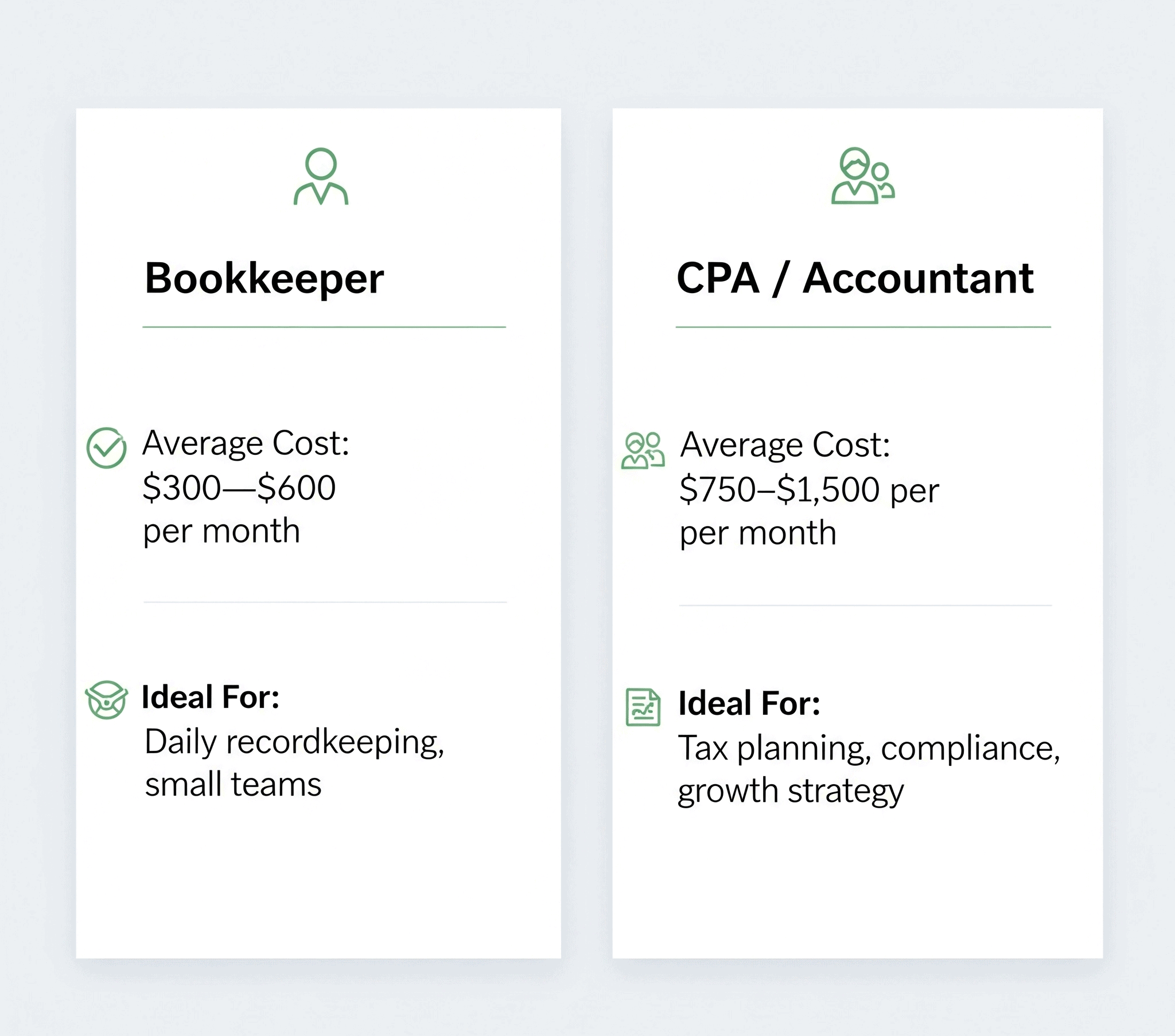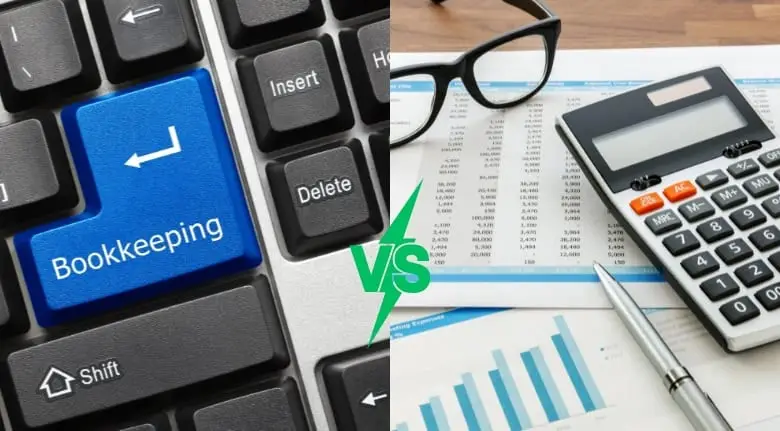Bookkeeping vs. Accounting: What Your Business Really Needs
Many small business owners in Texas ask the same question: Do I need a bookkeeper, an accountant, or both? While bookkeeping and accounting are closely related, they serve very different business purposes. In this blog, we break down the differences, benefits, and which one your business really needs in 2025.
What is Bookkeeping?
Bookkeeping is the process of recording daily financial transactions such as sales, expenses, payroll, and bank reconciliations. Bookkeepers are responsible for maintaining accurate and up-to-date records.
Key Bookkeeping Tasks
- Transaction categorization
- Bank and credit card reconciliations
- Invoicing and bill payments
- Monthly financial statement preparation
- Sales tax filing in Texas
What is Accounting?
Accounting takes the financial data gathered by bookkeepers and interprets it to offer insights, prepare tax documents, and ensure legal compliance. Accountants also offer strategic financial advice for business growth.
Key Accounting Services
- Tax preparation & planning (like deductions & credits)
- Financial forecasting
- Business structure advice (see: entity selection)
- Cash flow analysis
- IRS audit representation
Bookkeeper vs. CPA: Who Do You Need?
If your business handles daily transactions and needs basic record-keeping, a bookkeeper is a good fit. However, if you’re growing, filing taxes, or want long-term strategy, a CPA (Certified Public Accountant) adds tremendous value.
Looking to save on taxes? See our 2025 Tax Saving Strategies to discover smart ways a CPA can reduce your liability.
Cost Comparison

When Do You Need Both?
Most growing businesses benefit from having both: a bookkeeper for daily operations and a CPA for quarterly/annual reporting, tax filings, and high-level advice.
Outsourced Solutions for Texas Businesses
At Abbas Accounting & Tax PLLC, we offer hybrid bookkeeping + accounting packages tailored to businesses in Texas—including retail, real estate, construction, and healthcare.
FAQs
Q: Can a CPA do bookkeeping?
A: Yes, but it’s usually more cost-effective to have a bookkeeper handle daily tasks, with a CPA focusing on strategy and tax filings.
Q: Do I need a bookkeeper if I use QuickBooks?
A: Even with tools like QuickBooks or Xero, a professional ensures accuracy, tax-readiness, and compliance—especially when laws change.
Conclusion
Understanding the difference between bookkeeping and accounting is essential for running a compliant, scalable business. Bookkeepers keep the day-to-day in order, while accountants help you interpret the numbers, minimize taxes, and grow strategically. The best businesses use both for long-term success.
Schedule a free consultation with Abbas Accounting & Tax PLLC
Related Posts

Understanding Small Business Tax Deductions
Explore top deductions including home office, depreciation, and retirement plans for 2025.
Read More
Quarterly Bookkeeping Tips for Texas Businesses
Learn how to stay compliant and audit-ready each quarter with these proven bookkeeping tips.
Read More
EXCELLENTTrustindex verifies that the original source of the review is Google. Haider is an exceptional accountant. His CPA background and exceptional knowledge of the US tax code has been a great asset to my businesses. His work is very clean and thorough, while always making an effort to communicate with me each step of the way. I would highly recommend him for anyone looking to grow their business!Trustindex verifies that the original source of the review is Google. My husband and I can not tell you how grateful we are for Abbas Accounting & Tax. Haider is so helpful and very very knowledgeable. So many of our neighbors recommended him and we are glad we reached out. We now feel confident and actually have an understanding on how we SHOULD fill out our W4 and our taxes. We finally have a trusted tax & accounting expert that we will continue to utilize every year! Thank you!Trustindex verifies that the original source of the review is Google. I had an excellent experience with Abbas Accounting & Tax in Richmond. Their team is professional, knowledgeable, and genuinely cares about helping their clients. Haider Abbas made the process simple and stress-free, providing clear explanations every step of the way. Their expertise saved me both time and money on my taxes. I highly recommend Abbas Accounting & Tax to anyone seeking reliable, trustworthy, and friendly accounting services.Trustindex verifies that the original source of the review is Google. Haider has been incredibly helpful in guiding me through my tax filing process and helping me understand the advantages available to me. He took the time to explain everything clearly, making sure I was informed and confident in my decisions. Beyond just taxes, Haider also provided valuable insights into forming my LLC, helping me structure it in a way that benefits me both financially and legally. His expertise, professionalism, and willingness to go the extra mile truly set him apart.Trustindex verifies that the original source of the review is Google. I've known Haider Abbas for many years, and I can confidently say he is one of the most knowledgeable and trustworthy CPAs out there. He genuinely cares about his clients and takes the time to explain everything in a way that makes sense. Whether it’s tax preparation, accounting, or financial advice, he goes above and beyond to ensure accuracy and maximize savings. His professionalism, attention to detail, and commitment to client success truly set him apart. If you're looking for a reliable CPA who will always have your best interests in mind, especially when tax season is upon us, I highly recommend Abbas Accounting & Tax!Trustindex verifies that the original source of the review is Google. He’s done our taxes for over ten years and has saved us so much money every year. Haider has great knowledge and expertise with the ability to communicate effectively and adapt to our needs. It has been a pleasure working with him for over a decade! Highly recommend.Trustindex verifies that the original source of the review is Google. Best place to get your taxes done. Haider has great knowledge & expertise to handle your business or personal taxes.Trustindex verifies that the original source of the review is Google. Great service. Haider Abbas explains taxes in a simple manner and helps to make sure you are getting your full refund, by knowing the tax laws so well. Would highly recommend to everyone!Verified by TrustindexTrustindex verified badge is the Universal Symbol of Trust. Only the greatest companies can get the verified badge who has a review score above 4.5, based on customer reviews over the past 12 months. Read more



[…] Bookkeeping vs. Accounting […]